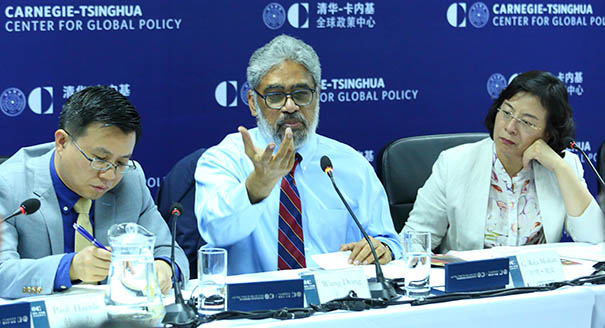Registration
You will receive an email confirming your registration.
2017 proved to be a troubled period in China-India relations. The two countries were unable to resolve tensions over Beijing’s Belt and Road Initiative, border disputes, and India’s inclusion in the Nuclear Suppliers Group. China and India may now be trying to reconcile their differences, as evidenced by President Xi and Prime Minister Modi’s meeting at the end of April. But repairing ties will not be easy. The revival of India's role in a quadrilateral ‘Indo-Pacific’ strategy and China’s increased presence in South Asia, in particular through the China-Pakistan Economic Corridor and Belt and Road Initiative infrastructure projects in Bangladesh and Sri Lanka, continue to foster distrust.
Shortly following the Xi-Modi summit, Carnegie–Tsinghua Center Director Paul Haenle moderated a discussion with Chinese and international scholars analyzing the prospects for bilateral ties between the world’s two most populous countries, as well as examining the U.S. role in South Asia and the Indian Ocean.
This panel was the fifth of the Carnegie Global Dialogue Series 2017-2018 and cosponsored by the Pangoal Institution. This event was off the record.
DISCUSSION HIGHLIGHTS
- Prospects for China-India Relations After the Xi-Modi Summit: Panelists underlined the importance, both in substantive and symbolic terms, of the Xi-Modi informal summit held in late April in Wuhan. After a period of escalating tensions culminated in the Doklam crisis in 2017, both sides welcomed Xi and Modi’s significant effort to stabilize the bilateral relationship. While an informal meeting, it defined the emerging themes of Sino-Indian relations and demonstrated that the two countries and leaders are willing to work together. Territorial disputes remain divisive, but there is consensus in both countries about moving toward a multipolar world order.
- The Evolution of India’s Non-Alignment Policy Since Independence: The participants discussed how India’s non-alignment policy has both changed over the years and morphed in light of China’s emergence as a global power. India’s pragmatic foreign policy approach, developed during the Cold War, acted as a defensive mechanism that insulated the country from unwanted involvement in global and regional issues. However, as a major economy that feels it is being encircled by China, India’s non-alignment principle has become a tool it uses to actively engage great powers. Scholars, however, questioned the extent to which this approach can remain non-confrontational.
- Envisioning a China-India Great Power Relationship: As one discussant put it, Russia, Japan, and the U.S. might come and go, but neighbors do not. With an extensive land border and millennia of cultural interactions, China and India must develop a framework to manage what is becoming a great power relationship. Scholars from both countries agreed on the importance of communicating and respecting each other’s core interests. Great power issues are bound to trump multilateralism, one panelist argued, so India and China must work to formalize cooperation efforts. Joint ventures in Central Asia and improved access for Chinese capital in India could serve as starting points.
- China’s Encirclement of India with the BRI: With projects in several South Asian countries that surround the Subcontinent, China’s Belt and Road Initiative is perceived in India as a significant existential threat. The China-Pakistan Economic Corridor, China’s military base in Djibouti, and its 99-year lease of the strategic port of Hambantota exemplify Chinese threats to India’s core interests. Discussants noted that, while India rejects competition in what it considers its traditional sphere of influence, China refuses to speak on such terms, highlighting the level of mistrust and miscommunication in the bilateral relationship. Nevertheless, potential joint infrastructure projects, such as one proposed in Afghanistan, show there might be a way to mitigate differences regarding the BRI. Another panelist noted that India might benefit from BRI projects if China and India can further stabilize relations.
Paul Haenle
Paul Haenle is the director of the Carnegie–Tsinghua Center for Global Policy based at Tsinghua University in Beijing. Haenle’s research focuses on Chinese foreign policy and U.S.-China relations.
Wang Dong
Wang Dong is an associate professor at the School of International Studies and deputy director of the Institute for China-U.S. People to People Exchange at Peking University. He also serves as secretary general of the Academic Committee of the Pangoal Institution, a leading China-based public policy think tank. He is also a member of the steering committee of the East Asia Security Forum at the China Overseas Educated Scholars Association.
C. Raja Mohan
C. Raja Mohan is director of Carnegie India. A leading analyst of India’s foreign policy, Mohan is also an expert on South Asian security, great power relations in Asia, and arms control. He is the foreign affairs columnist for the Indian Express, and a visiting research professor at the Institute of South Asian Studies, National University of Singapore. He was a member of India’s National Security Advisory Board.
Han Hua
Han Hua is associate professor and director of the Center for Arms Control and Disarmament at the School of International Studies (SIS) at Peking University. She teaches courses on international relations in South Asia, international arms control, disarmament and nonproliferation, and U.S. politics and foreign policy. Han is also a member of the Academic Committee of the Pangoal Institution.
Frederic Grare
Frederic Grare is a nonresident senior fellow in Carnegie’s South Asia Program. His research focuses on South Asian security issues and the search for a security architecture. He also works on India’s “Look East” policy, Afghanistan and Pakistan’s regional policies, and the tension between stability and democratization, including civil-military relations, in Pakistan.
Lan Jianxue
Lan Jianxue is an associate research fellow at the China Institute of International Studies (CIIS). Before joining CIIS in 2009, Dr. Lan worked as a researcher at the Chinese Academy of Social Sciences (CASS) for a few years. From 2010 to 2013, he was deputy head of the Political Section at the Chinese Embassy in New Delhi.
